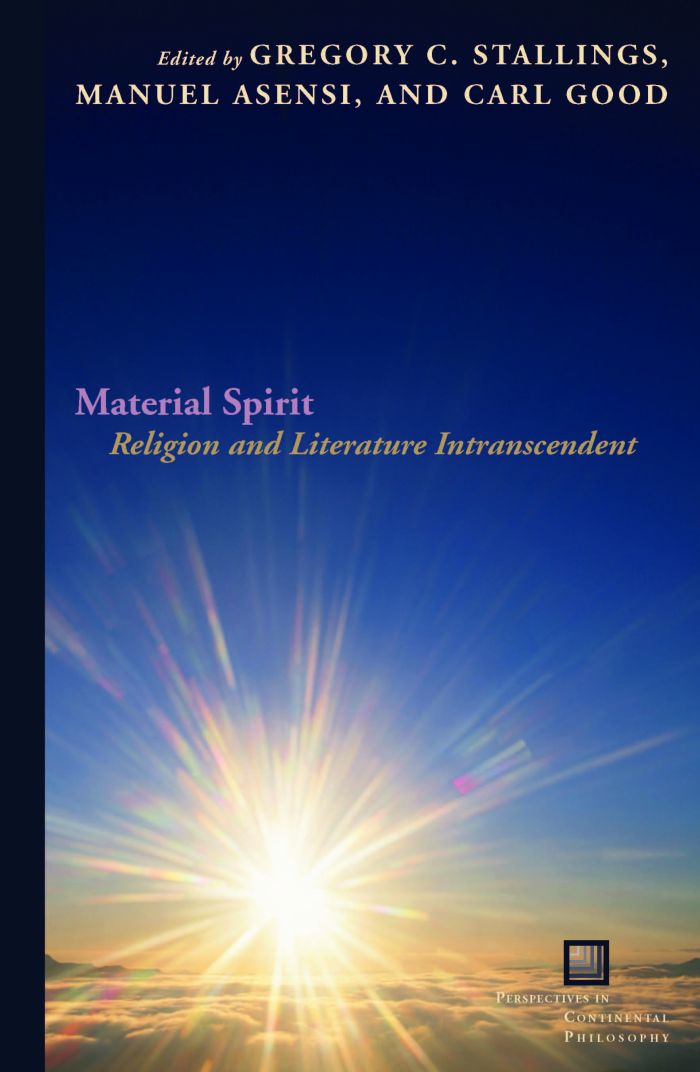Material Spirit
Religion and Literature Intranscendent

This book can be opened with

The essays in this collection examine philosophical, religious, and literary or artistic texts using methodologies and insights that have grown out of reflection on literature and art. In them, them phrase “material spirit” becomes a point of departure for considering the continuing spectral effects of religious texts and concerns in ways that do not simply call for, or assume, new orrenewed forms of religiosity.
The writers in this collection seek to examine religion beyond traditional notions of transcendence: Their topics range from early Christian religious practices to global climate change. Some of the essays explore religious themes or tones in literary texts, for example, works by Wordsworth, Hopkins, Proust, Woolf, and Teresa of Avila. Others approach—in a literarycritical
mood—philosophical or para-philosophical writers such as Bataille, Husserl, Derrida, and Benjamin. Still others treat writers of a more explicitly religious orientation, such as Augustine, Rosenzweig, or Bernard of Clairvaux.
Material Spirit will be a stimulating read for anyone who takes immanence seriously in, and especially across, philosophical, religious, literary, and cultural registers. Rather than rehearsing well-worn arguments or rehashing old debates, the contributors innovatively interpret the titular phrase, combining disciplines, methods, texts, and topics as seemingly unlikely, but as ultimately provocative, as the phrase 'material spirit.'
The contributions to Material Spirit are original, compelling, and beautifully interwoven. Together, they carve out a space that is neither religious nor not-religious, avoiding the dangers of unreconstructed immanence on the one hand and escapist transcendence on the other.
Manuel Asensi is professor and chair of the Department of Literary Theory at the University of Valencia, Spain. His work focuses on literary theory, literature, film studies, and mystical poetry. He is the author of numerous books of criticism, including Crítica y sabotaje (Anthropos/Siglo XXI, 2011) (currently being translated into English as Sabotage Critique), Los años salvajes de la teoría: Philippe Sollers, Tel Quel y la génesis del pensamiento post-estructural francés (The Savage Years of Theory: Sollers, Tel Quel and the Genesis of French Poststructuralism) (Tirant lo Blanch,2004), J. Hillis Miller or Boustrophedonic Reading/Others (with J. Hillis Miller, Stanford University Press,1999), and Literatura y filosofía (Literature and Philosophy) (Sintesis,1995). He has also written a three-volume history of literary theory, published by Editorial Tirant lo Blanch, and several monographs on Cervantes, Derrida, Hitchcock, and early German Romanticism.
Carl Good (Author)
Carl Good is a freelance translator who lives in Chicago. He formerly taught in the Spanish departments of Emory University and Indiana University, Bloomington. He has edited the collection The Effects of the Nation: Mexican Art in an Age of Globalization (Temple University Press, 2001) and has published numerous articles on Hispanic American literature and literary theory. He serves as co-editor of the journal Discourse: Journal for Theoretical Studies in Media and Culture.

